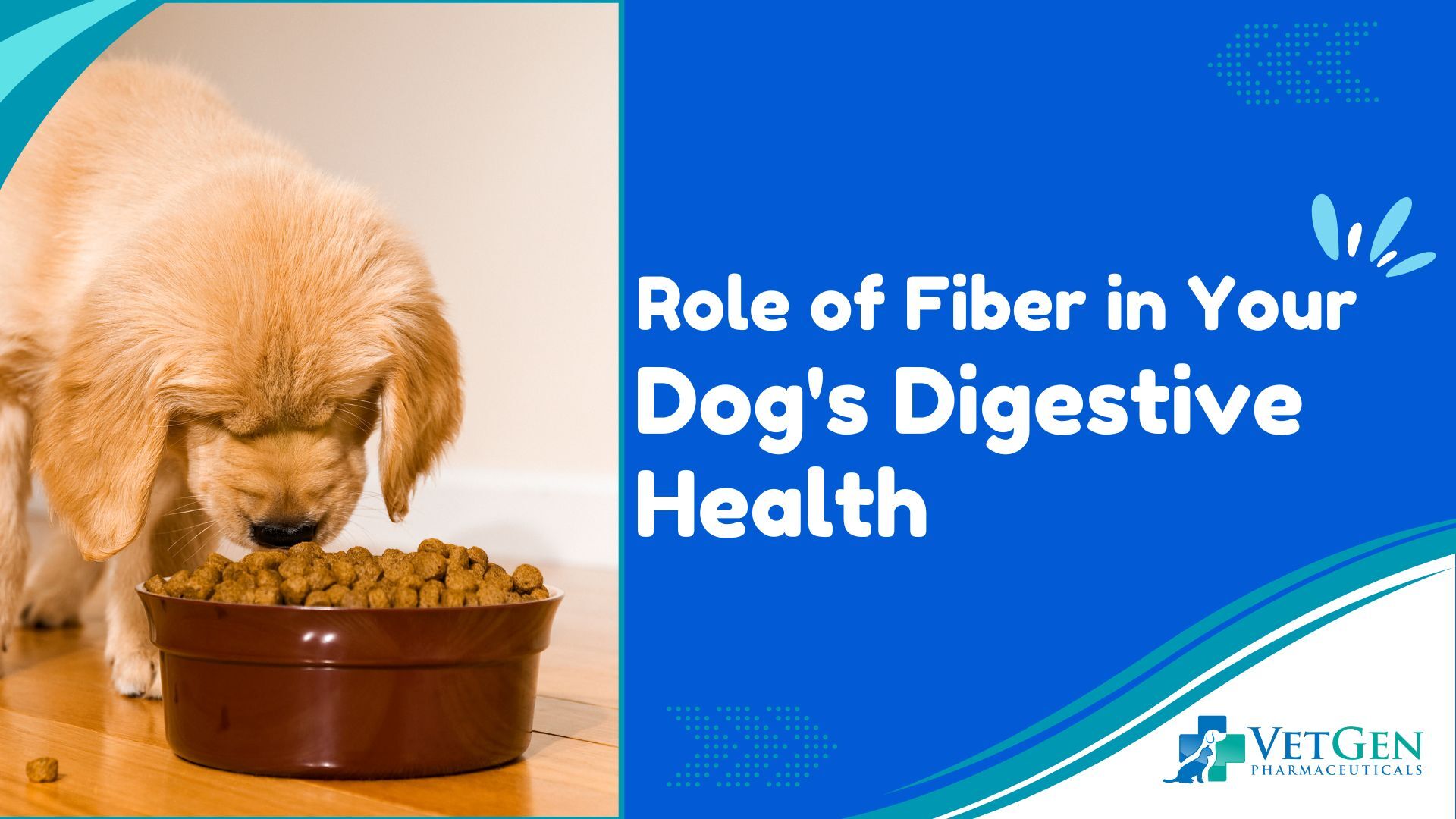If you own a dog, you’ve undoubtedly heard that fiber is important for their diet, but what does fiber actually include, and why is it so important for your dog’s health?
Knowing the importance of fiber will allow you to make wise nutritional decisions for your dog and guarantee a long, happy life.
Understanding Fiber and Its Types
Fiber is a carbohydrate that is present in plant-based diets but is usually indigestible by the dog’s digestive enzymes. There are two types of fiber: soluble fiber and insoluble fiber.
While insoluble fiber stays intact during digestion, soluble fiber dissolves in water and creates a gel-like material. Both are good fiber for canine digestion. Soluble fiber slows down digestion, keeps blood sugar levels steady, and improves nutrient absorption. On the other hand, insoluble fiber gives the stool more volume, which encourages regular bowel movements and prevents constipation.
Benefits of Fiber for Dog’s Digestive Health
There are several dog dietary fiber benefits. Dogs must consume enough fiber to maintain a healthy digestive system. One of the main advantages of fiber is its capacity to control bowel movements. Since insoluble fiber thickens the stool, waste can travel through the intestines more effectively. This helps avoid diarrhea, constipation, and other gastrointestinal issues.
The colon’s fermentation of soluble fiber results in the production of short-chain fatty acids that nourish the gut’s friendly bacteria, which is another reason soluble fiber is crucial for maintaining healthy bacteria. Dog gut health and fiber are connected. A healthy gut microbiota in dogs is associated with improved nutritional absorption, improved digestion, and a stronger immune system.
Fiber is also crucial for dogs to maintain a healthy weight. Dogs that eat a diet high in fiber are less likely to overeat because they will feel full and content. This helps dogs that are overweight or obese to eat fewer calories and still feel full.
How Much Fiber Is Appropriate for Dogs?
The fact that fiber can cure diarrhea in dogs while also accelerating bowel motions may seem contradictory. According to AKC, eating too much fiber might lead to loose stools. So, you need to make sure that you give a fixed amount of fiber to your dog.
A dog’s diet should consist of 2% to 4% fiber and should always include high-quality meat protein, as well as other necessary vitamins and minerals. It is a good idea to consult a vet before you make any changes to your dog’s diet to make sure the dog digestive health stays good.
Dog Foods Rich in Fibers
High-fiber dog food does not mean low in taste. Here are some pup-approved high-fiber foods you can include in your furry friend’s diet:
- Pumpkin: Not only is pumpkin a fall-time favorite, but it’s also high in fibrous fruit that can help with diarrhea and constipation. Canned pumpkin is available throughout the year and can be served with your pet’s meals. If you don’t want to give canned pumpkin, you can get it seasonally from the local store and add it to your dog’s diet.
- Carrots: Carrots are rich in fiber and low in calories. It is perfect for dogs that are having weight problems. You can add it to dry recipes or serve it as a snack.
- Apples: Apples are a great way to get fiber and vitamins A and C. For added nutrition, you can also stir in Chicken Breast with Broccoli.
- Green Beans: This is a wholesome, fiber-rich treat that is also green. Green beans are full of health benefits and low in calories, making them an excellent choice for a snack or a dinner addition.
- Brown Rice: Although it doesn’t sound very tasty, brown rice makes a great, high-fiber side dish for dog meals. Brown rice is an organic way to comfort your dog’s upset stomach. It’s also a good source of vitamins.
- Sweet Potato: Your dog’s bowl would benefit greatly from a small sweet potato. They not only support healthy digestion but also strengthen the immune system. Additionally, they taste even better with beef. Make sure that any sweet potato you give your dog is cooked; never give it raw.
- Strawberry: Strawberries are an excellent natural source of dietary fiber and also provide your pet with a significant antioxidant boost. Strawberries may be small, but they pack a strong nutritional punch since they are full of vital omega-3 fatty acids, numerous vitamins, potassium, magnesium, and folic acid.
Best Fiber Supplements for Dogs
If your dog doesn’t like certain fiber-rich foods, you can always add fiber supplements for dogs to complete their dietary needs. Here are some good options:
- Honest Kitchen Herbal Digestive Supplement: This mixture is made with human-grade ingredients with a focus on the dog’s gut health and stool consistency. It contains herbs to protect and soothe your dog’s GI tract. All you have to do is mix the powder with the right amount of water to create a gel that dogs will love to eat.
- NaturVet No Scoot Plus Pumpkin: Digestive issues can cause your dog to scoot across the floor. However, NaturVet’s strong and delicious “no scoot” soft chews are made to help restore healthy anal glands in addition to helping your dog’s bowel movements. These delicious morsels have a special combination of pumpkin powder, dandelion root, psyllium husk, and beet pulp.
- Native Pet Organic Pumpkin Fiber for Dogs: Pet parents who give pumpkin as a natural cure for scooting and other digestive problems can find Native Pet’s fiber supplement to be helpful. Just combine a dosage of Native Pet’s organic fiber powder with water.
- Super Pet Total Health: This supplement offers acacia fiber, a safe and efficient natural prebiotic that supports your dog’s intestinal health, and is combined with all the health benefits of extra virgin olive oil. Additionally, it can support joint, coat, and skin health.
Conclusion
Fiber plays an important role in improving and maintaining your dog’s digestive health. However, you’ll have to observe how your dog reacts to high-fiber foods. It’s always better to get an opinion from your vet who has an idea of your dog’s health history to help you add fiber to your dog’s diet in a natural way.
Frequently Asked Questions
How to tell if a dog needs more fiber?
Observing your dog’s poop is the greatest method to ensure that it is receiving the proper quantity of fiber. Small, hard stools from constipated dogs may indicate an excess of fiber in their diet, but runny stools and episodes of diarrhea may indicate a deficiency.
Which dog food is high in fiber?
Some foods that contain high fiber include carrots, broccoli, kale, pumpkin, and apples. You can also find tasty high-fiber treats for your dog.
How can I add more fiber to my dog's diet?
You can add a variety of fruits and vegetables to your dog’s diet. Apples, sweet potatoes, carrots, pumpkin, and green beans are a few healthy choices. Dogs can also benefit from eating whole grains like barley, oats, and brown rice as sources of fiber.






